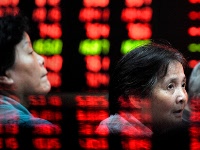Registration
You will receive an email confirming your registration.
IMGXYZ2438IMGZYXThe recent financial crisis has reignited debate on capital controls. Before the crisis, most financial institutions believed government control of the inflows of capital was bad for a nation’s economy and credit rating. During the crisis, however, several countries, including Brazil, Colombia, Thailand and Malaysia among others, imposed capital controls that helped reduce economic volatility. This has cleared the stigma that capital controls are bad for the economy, according to a distinguished panel of experts hosted by Carnegie.
Marcos Chamon, an economist at the IMF, highlighted the findings of a recent IMF Staff Position Note on controls in capital inflows and Jorge Arbache, a senior economic advisor to the president of Brazil's National Development Bank (BNDES), and Boston University’s Kevin Gallagher discussed the policy space available to developing countries for imposing capital controls. Carnegie’s Eduardo Zepeda moderated.
Capital Controls and the Global Financial Crisis
Capital inflows are fundamentally positive when there is a general need for additional financing for productive investment and risk diversification, explained Chamon. However, when there are sudden and temporary surges that could potentially increase macroeconomic volatility, capital controls can be valuable tools.
During the crisis, net capital flows into emerging markets dropped by more than US$ 200 billion between the third and fourth quarters of 2008. Capital controls could help manage that kind of economic volatility:
- Changed perception: “The recent crisis has added ammunition to the already abundant stock of evidence in favor of controlling short-term capital controls in developing countries to curb vulnerability and avoid undue macro-economic imbalances,” argued Zepeda.
- Controls help economic resilience: Recent evidence from countries such as Malaysia and Thailand, who had imposed capital controls prior to the crisis, shows the strong resilience of their economies during and after the crisis, argued Chamon.
- Conditions for controls: Chamon added that capital controls might be appropriate when:
- currency is overvalued.
- further reserve accumulation is undesirable.
- there are concerns about inflation or overheating of the economy.
- there is a limited scope for fiscal tightening.
- there is a high risk of financial fragility even after prudential reform framework.
- Not bad any more: The post-crisis economic soundness of the countries that imposed capital controls before the crisis has cleared the bad perception associated with such policy, stated Gallagher. Even credit rating agencies have stopped downgrading the rating of countries that impose capital controls.
- Weak institutions: Arbache stated that countries with weak institutions are more likely to impose greater control on capital inflows and outflows.
The Trade Regime
Policies to prevent and mitigate financial crises are forbidden in large parts of the trade regime. The panelists suggested that there should be exceptions for capital controls in trade and investment treaties between countries.
- Barriers to controls: Trade and investment treaties pose significant barriers to the effective use of capital controls, argued Gallagher.
- Lack of policy space: Most trade agreements do not leave their signatories policy space for capital control. For instance, the WTO and the U.S. Bilateral Investment Treaty and Free Trade Agreement do not allow members to adopt controls in capital inflow and outflow, Gallagher added.
The Example of Brazil
Brazil imposed several capital control measures, including taxes on capital account transactions and on fixed-income and equity inflows. Arbache argued that a more vigorous capital control is needed as a short-term policy option. The Brazilian economy is facing a number of pressing problems, which might require capital controls combined with structural policies for fiscal reform, including:
- appreciating exchange rate.
- widening current account deficit .
- decreasing export competitiveness.
- rising asset prices.
- rising inflation pressure.
- monetary policy that is losing its effectiveness.
Capital Controls as a Tool
Capital controls might be suitable for curbing sudden short term capital flows, Gallagher offered. They could be one of several tools used to stem financial market instability. In such a case, capital controls should be a coordinated effort among a majority of the central banks, concluded Gallagher.
